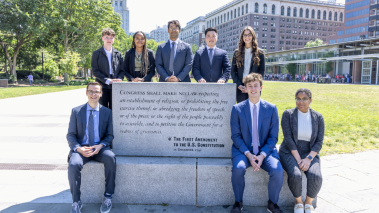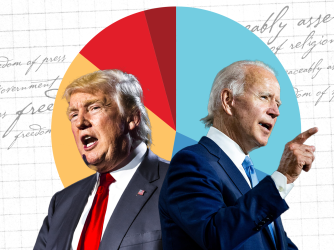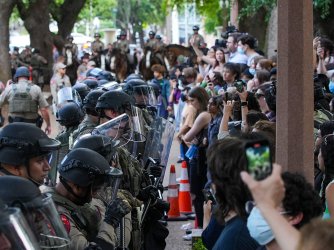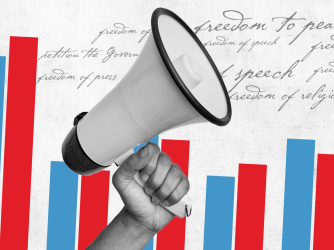Table of Contents
FIRE’s 2023 interns talk free speech, First Amendment cases, and FIRE

FIRE's 2023 interns (left to right, top to bottom): Emma Maple, Nia Cain, Manas Pandit, Daniel Shaw, Dylynn Lasky, Justin Crosby, Charlie Hatcher, Vydalia Weatherly
Each year, FIRE welcomes a cohort of undergraduate interns into its Philadelphia office for its summer intern program. The highly-competitive program actively seeks out change-makers, student defenders, and civil rights enthusiasts on American college and university campuses.
This year, FIRE is excited to welcome eight new interns:
- Nia Cain, Ohio State University class of ‘24.
- Justin Crosby, Yale University class of ‘25.
- Charlie Hatcher, Claremont McKenna College, class of ‘25.
- Dylynn Lasky, College of Wooster class of ‘24.
- Emma Maple, Whitworth University class of ‘24.
- Manas Pandit, University of Massachusetts Amherst class of ‘25.
- Daniel Shaw, Princeton University class of ‘25.
- Vydalia Weatherly, Mercyhurst University class of ‘24.
Over the course of the 10-week free speech internship program, interns work with nearly all FIRE departments on research, outreach, and policy tasks to promote free speech across the country. Learn more about our summer interns below!
Intern responses have been edited for clarity and length.
Nia Cain is a rising senior at Ohio State University pursuing a degree in political science with a minor in the legal foundations of society and a specialization in democracy and law.
What do you hope to learn from FIRE’s internship?
I really look forward to learning more about due process and how to use it in conjunction with the First Amendment to assist my peers in voicing their beliefs. I believe that we are currently in a time when learning how to productively engage in civil discourse is a necessary tool that many people can benefit from and I am excited for FIRE to imprint this skill on me, and to carry this knowledge back to campus.
What inspired your passion for FIRE’s issues?
I belong to the Morrill Scholarship Program at the University, and a large part of the program is rooted in advocacy work in the community and encouraging students to utilize their First Amendment rights, which is where my passion for FIRE’s due process work originated.
Justin Crosby is a rising junior at Yale University studying political science.
What inspired your passion for FIRE's issues?
My passion for FIRE’s issues trace back to my revelation that in the pursuit of constructive disagreement, we must not forget the importance of allowing for that initial disagreement. Empathy can take time, especially in the shadow of turbulent national politics, but I have seen time and time again that an open dialogue is imperative to true understanding.
Outside of your work at FIRE, what is one thing that you hope to do in Philadelphia this summer? Why?
Coming from Boston, I have been captivated by living reminders of the American Revolution for my whole life. In Philadelphia this summer, I am really excited to make my way around the Old City to learn about the Revolution from a different angle.
Charlie Hatcher is a rising junior at Claremont McKenna College studying government and data science.
What do you hope to learn from FIRE's internship?
I want to dive into the world of civil liberties on campus and become (as best I can) a resource to whom my peers on campus can turn to ensure their rights are respected . . . The opportunity to work closely with some of the foremost First Amendment attorneys in the country is incredible, and I intend to make the most of it!
What's the most impactful book you've read and why?
The most impactful book I’ve ever read has to be Bryan Stevenson’s “Just Mercy.” It destroyed my idealistic conception of courts and the criminal justice system, laying out in such painful detail how mistakes in criminal proceedings, either innocent or malicious, can so deeply affect people’s lives. Stevenson does such a good job at looking past people’s offenses and showing the reader the vulnerable, fallible human underneath.
Dylynn Lasky is a rising senior at the College of Wooster studying psychology, political science, and law.
What inspired your passion for FIRE’s issues?
My passion for FIRE’s issues sparked during my first year of college when I noticed a culture that was not hospitable to differing perspectives on contentious political and cultural issues. A friend introduced me to FIRE, which led me to attend the FIRE Student Network summer conference in 2021. The conference solidified my passion for protecting campus free expression.
What's your favorite First Amendment case and why?
R.A.V. v. City of St. Paul: The facts of the case surround a group of teenagers that burned a cross on the front lawn of a black family then faced charges under the city’s Bias-Motivated Crime Ordinance. The court unanimously held the ordinance facially unconstitutional, but public backlash to this decision was significant, given it protected hateful racially motivated speech. This is one of my favorite cases because it underscores the importance of officials not infringing free speech, despite a presumably collective agreement in favor of punishing hate crimes to the full extent of the law.
Emma Maple is a rising senior at Whitworth University. She is majoring in communications and peace studies with minors in sociology and philosophy.
What do you hope to learn from FIRE's internship?
I hope to learn about how the marketplace of ideas can exist in the real world with an unbiased perspective, and what that looks like . . . I’m excited to be able to exist in a space where I am fighting for the right to speak, rather than necessarily for what is being spoken, and seeing what this looks like in the real world.
Outside of your work at FIRE, what is one thing that you hope to do in Philadelphia this summer? Why?
I am excited to try out some whitewater activities in a river near Philadelphia. Rivers are how I found happiness outside of academics, and I’m super excited to be able to experience a river I've never seen before.
Manas Pandit is a rising junior at the University of Massachusetts Amherst majoring in economics.
What inspired your passion for FIRE's issues?
I've been a bit of a free speech nut ever since I was a kid. Growing up outside the U.S. (in India) I would always envy the kind of freedom of expression the U.S. seemed to possess, relative to home.
What's your favorite First Amendment case and why?
Texas v. Johnson is my North Star for free speech regulation and in my mind epitomizes the concept of free speech. Even flag burners — nay, especially flag burners — get free speech, because that’s the whole point. It’s not there to protect agreeable ideas . . . it’s there to protect the ones that will get you thrown out of polite society.
Daniel Shaw is a rising junior at Princeton University studying politics with interests in constitutional law, democratic backsliding, and liberal theory.
What inspired your passion for FIRE's issues?
As the child of immigrants who protested for Chinese democracy in 1989, I understand at a personal level the power of the “eternally radical idea” to challenge and overturn orthodoxy. As a child, I heard time and again how fortunate our family had been to receive protections in the United States after the 1989 protests in China by Executive Order 12711 and the Chinese Student Protection Act, escaping the brutal political repression that followed Tiananmen. I would also hear stories about family members who had not been so lucky . . . My history and story compel me to return the favor granted me by past advocates for our civil liberties, regardless of how unpopular the people or the causes we might be called on to defend.
What's your favorite First Amendment case and why?
West Virginia v. Barnette, a classic case regarding compelled speech doctrine. The majority’s famous line that “if there is any fixed star in our constitutional constellation, it is that no official, high or petty, can prescribe what shall be orthodox in politics, nationalism, religion, or other matters of opinion or force citizens to confess by word or act their faith therein” forms part of one of the most forceful defenses of freedom of expression that the Court has ever put forward, and for that reason, is certainly worth remembering.
Vydalia Weatherly is a rising senior at Mercyhurst University majoring in political science and criminal justice with a minor in history.
What inspired your passion for FIRE's issues?
As someone who did not possess the ability to speak for more than half their life, I know the importance of protecting free speech. When I was four years old, I was diagnosed with a severe stutter. From preschool to ninth grade, I underwent intense speech therapy. Due to not being able to speak, people would frequently speak for me. They would make assumptions about my desires and how I thought. Those individuals were often wrong. I know how it feels to be silenced, so I continuously utilize my voice to vocalize those who cannot speak up for themselves. It is only through having a voice that people can advocate for themselves.
Outside of your work at FIRE, what is one thing that you hope to do in Philadelphia this summer? Why?
I have designated this the “Summer of New Experiences.” While in Philadelphia, I hope to push myself outside my comfort zone and do things I have not done before. Philadelphia is filled with a copious amount of history and culture, and I want to explore as much as I can!
Recent Articles
FIRE’s award-winning Newsdesk covers the free speech news you need to stay informed.

New FIRE poll: Americans equally skeptical Biden or Trump will protect First Amendment rights

Here’s what student journalists need to know about covering campus protests



